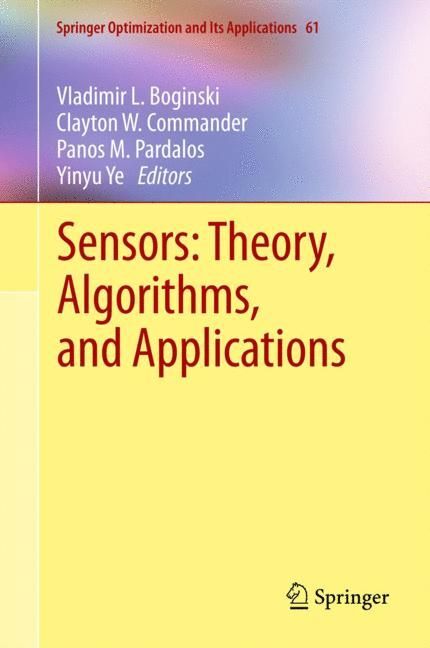Boginski, Vladimir L. (Hrsg.)
Commander, Clayton W. (Hrsg.)
Pardalos, Panos M. (Hrsg.)
Ye, Yinyu (Hrsg.)
Sensors: Theory, Algorithms, and Applications

Beschreibung
In recent years, technological advances have resulted in the rapid development of a new and exciting research direction the interdisciplinary use of sensors for data collection, systems analysis, and monitoring. These highly calibrated sensors require precision engineering techniques that play an important role in analyzing and integrating large datasets. Sensor networks in particular represent a very active area of research, including work on problems such as sensor network localization and network design. Application areas for sensors and sensor networks include environmental monitoring, military surveillance, computational neuroscience, seismic detection, and a great deal more.
The fundamental problems of utilizing the collected data for efficient system operation and decision making encompasses multiple research areas, including applied mathematics, optimization, signal/image processing, as well as emerging areas that require interdisciplinary techniques from several fields of research.
Sensors: Theory, Algorithms, and Applications brings together recent developments from researchers representing various fields from engineering, mathematics, and computer science, along with application areas of biomedicine, transportation, and military systems. This volume is ideal for scientists, practitioners, and graduate students who are interested in the knowledge, ideas, and techniques involved in state-of-the-art sensor research. In recent years, technological advances have resulted in the rapid development of a new exciting research direction --- the interdisciplinary use of sensors for data collection, systems analysis, and monitoring. Application areas include environmental monitoring, military surveillance, computational neuroscience, seismic detection, and many more. Among the research areas considered, sensor networks represent a very active area, as well as work on problems such as sensor networks, sensor network localization, and network design. They are also related to optimization problems that have multiple applications and require interdisciplinary techniques from several fields. Additionally, neuroscientists use sensors to collect data during tests which record brain activity. These highly calibrated sensors require precision engineering techniques play an important role in analyzing and integrating large datasets.
The purpose of this book is to bring together recent developments of both theoreticians and practitioners representing various fields from engineering, computer science, biomedicine, and the military, share knowledge, ideas, and techniques regarding the state-of-the-art sensor research. The objective of this book is to advance the current knowledge of sensor research particularly highlighting recent advances, current work, and future needs. The goal is to share current technologies and steer future efforts in directions that will benefit the majority of researchers and practitioners working in this broad field of study.
The fundamental problems of utilizing the collected data for efficient system operation and decision making encompasses multiple research areas, including applied mathematics, optimization, signal/image processing, as well as emerging areas that require interdisciplinary techniques from several fields of research.
Sensors: Theory, Algorithms, and Applications brings together recent developments from researchers representing various fields from engineering, mathematics, and computer science, along with application areas of biomedicine, transportation, and military systems. This volume is ideal for scientists, practitioners, and graduate students who are interested in the knowledge, ideas, and techniques involved in state-of-the-art sensor research. In recent years, technological advances have resulted in the rapid development of a new exciting research direction --- the interdisciplinary use of sensors for data collection, systems analysis, and monitoring. Application areas include environmental monitoring, military surveillance, computational neuroscience, seismic detection, and many more. Among the research areas considered, sensor networks represent a very active area, as well as work on problems such as sensor networks, sensor network localization, and network design. They are also related to optimization problems that have multiple applications and require interdisciplinary techniques from several fields. Additionally, neuroscientists use sensors to collect data during tests which record brain activity. These highly calibrated sensors require precision engineering techniques play an important role in analyzing and integrating large datasets.
The purpose of this book is to bring together recent developments of both theoreticians and practitioners representing various fields from engineering, computer science, biomedicine, and the military, share knowledge, ideas, and techniques regarding the state-of-the-art sensor research. The objective of this book is to advance the current knowledge of sensor research particularly highlighting recent advances, current work, and future needs. The goal is to share current technologies and steer future efforts in directions that will benefit the majority of researchers and practitioners working in this broad field of study.
Produktdetails
| ISBN/GTIN | 978-0-387-88619-0 |
|---|---|
| Seitenzahl | 242 S. |
| Kopierschutz | mit Wasserzeichen |
| Dateigröße | 9594 Kbytes |

